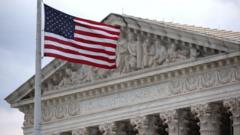The U.S. Supreme Court effectively upheld a state ruling on Thursday that blocks Oklahoma from directing public funds toward the establishment of what was poised to be the country’s first religious charter school. The justices deadlocked 4-4, leaving intact a decision from the Oklahoma State Supreme Court which had found that the proposed funding infringed upon the U.S. Constitution’s stipulations regarding the separation of church and state.
The charter school, intended to be managed by the Catholic Archdiocese of Oklahoma City and the Diocese of Tulsa, was set to receive approximately $23.3 million in taxpayer money over the next five years. Charter schools are publicly funded yet operate independently, and the Supreme Court's decision, although significant, does not set a nationwide precedent, leaving the door open for future legal challenges on similar grounds.
Justices did not disclose how they voted, but it appeared that opinions lined up along ideological divisions observed during an earlier hearing in April. Notably, Justice Amy Coney Barrett recused herself from the case without offering an explanation. The court’s announcement was brief, stating simply, "The judgment is affirmed by an equally divided Court."
This case has been viewed by experts as a critical examination of the First Amendment, which prohibits government endorsement of a particular religion. Traditionally, taxpayer-funded programs directed at public education have been shielded from benefiting religious entities.
Oklahoma Attorney General Gentner Drummond, a Republican, who initiated the lawsuit against the charter school, praised the court's decision, framing it as a victory for religious liberty and constitutional principles. He expressed concerns that funding a religious institution could set a precedent for state support of other religious schools, including potentially radical ideologies.
Conversely, proponents of the charter school claimed that the Court's ruling constituted a discriminatory stance against Christian educational institutions. They conveyed disappointment over the outcome and expressed a commitment to exploring alternative avenues for providing a virtual Catholic education to families in the state, catering to around 500 students from kindergarten through high school. The controversial approval decision for St. Isidore of Seville Virtual Catholic Charter School had sparked debates shortly after the Oklahoma State Virtual Charter School Board endorsed it in 2023.
Oklahoma's Governor, Kevin Stitt, endorsed the charter school's initiative, though it faced immediate opposition from Drummond, leading to the legal battle. The charter school movement remains relatively small within the U.S. educational landscape but has gained traction in recent years, especially among conservatives advocating for parental choice in educational matters.
As discussions around the future of educational funding and religious curriculum unfold, this ruling sets a notable marker in the ongoing legal discourse which intertwines governance, education, and faith.


















